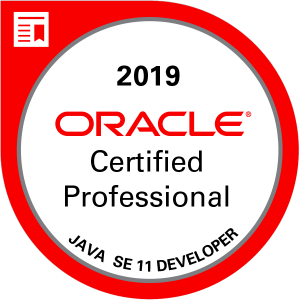
Update (11/05/2020): Read The 1Z0-819 Exam page to learn how you can easily our Java 11 Study Guides to prepare for Oracle’s 1Z0-819 Exam, as well as the 1Z0-817 Upgrade Exam.
Back in March, I took the new Java SE 11 Programmer I 1Z0-815 Exam only 2 days after it was released. Going into the exam blind, I wasn’t too worried because the previous OCA 8 1Z0-808 exam had been such a breeze. Boy was I surprised! While I passed with a decent margin, I was shocked the level of difficulty of the Programmer I 1Z0-815 exam. It was nothing like the 1Z0-808 exam it inherits from, especially in terms of question difficulty!
This past month, Jeanne and I finished writing our new Java OCP 11 Programmer I Study Guide (now available for preorder), which meant it was time to turn our attention to our upcoming Java OCP 11 Programmer II Study Guide. Rather than go in blind, and especially given all of the new material, I decided to spend some time studying *before* taking the 1Z0-816 exam. Well, it paid off because I passed today with a quite a wide margin. Below are some of my impressions of the exam.
Level of Difficulty
This might sound crazy, and I’m sure I’m biased, but overall I found the 1Z0-816 OCP11 exam less difficult than the OCP 8 1Z0-809 exam it inherits from. Don’t get me wrong, it was a difficult exam, but I felt like there were so many topics and they were so broad, the exam rarely went into especially deep detail on some of them. For example, many of the questions regarding SQL injection had pretty clear answers. In most of the questions, I was able to eliminate completely “ridiculous” answers right away, getting the answer choices down to 2 (or 3 if it was pick 2, or 4 if it was pick 3, etc). In fact, some questions I didn’t even need to read the text to whittle down the answer choices. For example, if an answer choice is an invalid lambda expression, it clearly cannot be a valid answer. With that in mind, most questions boiled down eliminating bad answers, then reading the question text to know which of the two remaining choices was correct.
Better Focused
One of the best changes they made in the new 1Z0-815/1Z0-816 exam series was to move most of the core Java syntactical questions to the first exam. While they made the 1Z0-815 exam harder, it made the 1Z0-816 exam a lot clearer. For example, if a question appears to be about NIO.2 on the 1Z0-816 exam, then it’s about NIO.2! On the older 1Z0-809 exam, I always felt like they mixed common Java topics with advanced ones. For example, a question that appears to be about NIO.2 on the 1Z0-809 exam might actually be about constructor overloading or overriding methods. In other words, the 1Z0-816 exam is better because the questions are derived from the objectives more cleanly, and there aren’t as many trick questions. You still have to know a lot to pass, but at least they aren’t mixing topics as much as they did in previous exams.
Streams, Streams, Streams
While the exam seemed reasonable to me, I’m also very proficient in streams. It is an understatement to say they are all over the exam. If you don’t use them regularly, you’ll need a lot of practice before taking the exam. Remember, they can show up in almost any topic like NIO.2, Concurrency, Collections, etc.
Modules
Modules are on the exam but I found the questions a lot more straight-forward than the module questions I saw on the 1Z0-815 exam. I had a lot of trouble with the module questions on the 1Z0-815 exam, in part because a lot of them didn’t make sense or didn’t appear to have a correct answer. Given how early I took the exam, Jeanne suspects I might have been exposed to beta/experimental/broken questions. That said, I thought the module questions on the 1Z0-816 exam were a lot more fair than they were on the 1Z0-815 exam. You need to know a lot about modules, of course, but the topics the questions were testing were a lot clearer.
Still a Very Broad Exam
While questions within a topic were relatively straight-forward, the amount of topics you had to know for the 1Z0-816 exam dwarfs the 1Z0-809 exam. Annotations, Security, Local Type Inference, Private/Static Interface Methods, and Modules are completely new. You should read the Secure Coding Guideline and Annotations Trail prior to taking the exam. Unfortunately, there’s not one single source of material for modules so you have to study from what you can piece together on the web… that is until our new 1Z0-816 study guide is released!
So You Want to Take the Exam?
Great! If you’re not in a hurry, I would wait for our new study guides to come out. The first book is already on its way to print and the second book will be available early next year. You can use our OCP 8 Study Guide to take exam, but you will have to supplement it with a lot of reading from a dozen different sources. And as I said earlier, if you’re not using streams regularly, you will definitely need a lot of practice. Regardless of which path you take, we wish you the best in studying!
